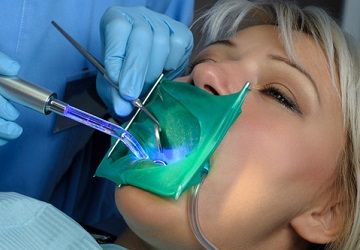For Women Over 50, Estrogen Could Help Prevent Gum Disease
Estrogen has long been prescribed to women dealing with menopause and osteoporosis. But according to a new study, the hormone's benefits for post-menopausal women does not end there. Continue below to learn about new research on the relationship between estrogen therapy and gum disease.

Periodontal disease, a serious gum infection, can lead to premature death.
In a new study from the University of Buffalo, researchers have discovered that estrogen used as part of treatment for osteoporosis — a condition in which the bones become brittle and fragile as a result of a loss of bone tissue — could also help women over the age of 50 avoid severe periodontitis. While previous studies have described the link between osteoporosis and tooth loss, this is the first study to examine the relationship between estrogen therapy and gum disease.
RELATED: More Coverage on
- Hiring an Associate? Here's How to Make It Work
- The Top and Bottom 10 Cities for Operating Efficiency
- Look for Advisors Committed to Doing No Harm
The results of the study showed that women 50 years old or older who are treated with estrogen for osteoporosis are 44 percent less likely to have severe periodontitis compared to women who do not receive such treatment. Data from the medical records of almost 500 postmenopausal women
was
included. Of these women, 356 were diagnosed with osteoporosis, and 113 received estrogen therapy as a part of their treatment for a minimum of six months.
Each study participant was postmenopausal for a minimum of one year. Factors such as race, educational
level
and income were also included in the study data. It was shown that the women who received estrogen treatments had less periodontal probing depth, less clinical attachment loss and less gum bleeding compared to women who did not receive estrogen therapy.
Higher family income level and more frequent dental visits were associated with a lower prevalence of gum disease.
“
These results help confirm the findings of previous studies that suggested that estrogen therapy to prevent osteoporosis could also play a role in the prevention of gum disease,”
Frank Scannapieco, D.M.D.
and
co-author of the study, says
. “By advancing our understanding of how this treatment can impact oral health, we can better work to improve the bone health and quality of life of female patients.”
Low levels of estrogen in the body
is
part of the normal process of menopause. Many women are prescribed estrogen along with other supplements, like calcium and vitamin D, to help prevent bone loss. However, estrogen therapy has been associated with adverse effects like an increased risk of heart disease and breast cancer. To better understand if estrogen’s role in the prevention and treatment of osteoporosis is beneficial in the prevention of gum disease, further research is needed.
Discover more Dentist’s Money Digest® news here.
ACTIVA BioACTIVE Bulk Flow Marks Pulpdent’s First Major Product Release in 4 Years
December 12th 2024Next-generation bulk-fill dental restorative raises the standard of care for bulk-fill procedures by providing natural remineralization support, while also overcoming current bulk-fill limitations.